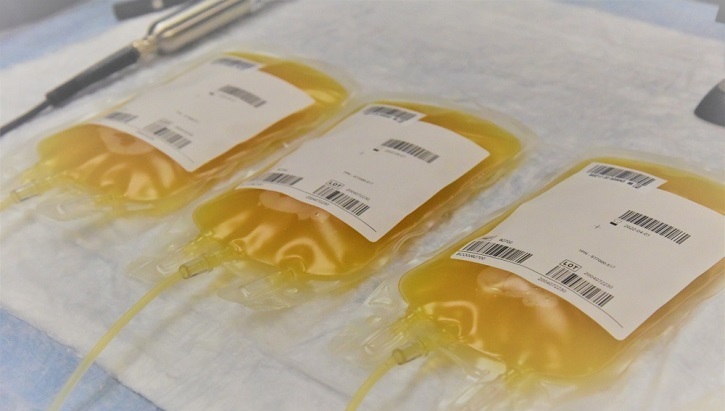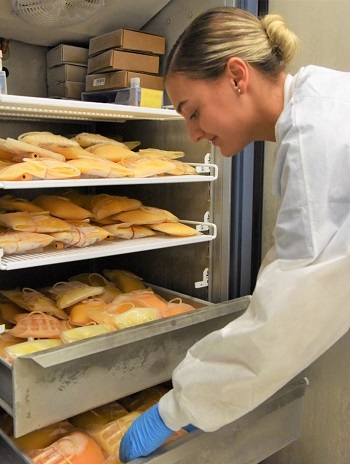COVID-19 Convalescent plasma collection continues
 The COVID-19 Convalescent Plasma, or CCP, collection campaign was a significant success in 2020. The DOD surpassed its goal by collecting more than 10,000 CCP units. The collection of CCP will to continue next year as well. (Photo by Jaciyn Matanane, Naval Hospital Guam.)
The COVID-19 Convalescent Plasma, or CCP, collection campaign was a significant success in 2020. The DOD surpassed its goal by collecting more than 10,000 CCP units. The collection of CCP will to continue next year as well. (Photo by Jaciyn Matanane, Naval Hospital Guam.)
The Defense Health Agency’s COVID-19 Convalescent Plasma, or CCP, collection was a significant success in 2020, exceeding its goal and helping more than 200 Department of Defense beneficiaries who had been hospitalized with the deadly disease.
The DOD campaign resulted in the acquisition of 10,745 units of the plasma donated by active-duty personnel, military retirees, their families, and non-DOD civilians who were designated as fully recovered from COVID-19. The goal of the secretary’s campaign, which ended Sept. 30, had been to collect 10,000 CCP units.
The Defense Health Agency (DHA) launched this donation drive on June 1 through its more than 20 Armed Services Blood Program (ASBP) centers across the continental United States and overseas to collect plasma to support the development of an effective treatment for those seriously ill with the virus.
As of Nov. 30, 204 patients within the MHS had been transfused 322 units of CCP, said ASBP Division Chief Army Col. Audra Taylor. Typically, one or two units are administered to each patient. At the outset of COVID, when CCP became available as an investigational product by the Food and Drug Administration, the treatment was for severely ill patients.
“Since those early days, the recommendations for treatment are earlier,” Taylor noted.
Almost all patients who require supplemental oxygen now also get CCP, noted Air Force Col. Stacy Shackelford, Joint Trauma System chief.
The immune system of a COVID-19-positive patient creates infection-fighting antibodies contained in their plasma. Plasma with these infection-fighting antibodies is called "convalescent plasma." By donating blood or plasma, a patient who has recovered fully provides CCP rich in antibodies to a sick patient who is still fighting the virus to boost their immune system and help them recover.
 Navy Hospital Corpsman 3rd Class Bailey Carter, assigned to U.S. Naval Hospital Guam, secures blood donations collected from sailors who recovered from COVID-19 this spring. The DOD surpassed its goal by collecting more than 10,000 CCP units. (Photo by Jaciyn Matanane, Naval Hospital Guam.)
Navy Hospital Corpsman 3rd Class Bailey Carter, assigned to U.S. Naval Hospital Guam, secures blood donations collected from sailors who recovered from COVID-19 this spring. The DOD surpassed its goal by collecting more than 10,000 CCP units. (Photo by Jaciyn Matanane, Naval Hospital Guam.)
Since the close of the initial CCP drive, the Armed Services Blood Program (ASBP) has transitioned to a plan to ensure adequate supplies of CCP for future DOD beneficiaries.
“The ASBP recruiters and blood donor centers continue to use the tools and processes developed for the recruitment of potential donors to support the sustainment of the Department of Defense CCP inventory,” Taylor said, adding that “the designated inventory levels sustain the Military Health System, including the combatant commands.”
Unfortunately, CCP has a one-year shelf life, so collected units will begin to expire in 2021.
Therefore, there is no end date for collection, Taylor noted. A new CCP collection challenge comes with the new COVID-19 vaccines, which, when approved by FDA and distributed for vaccination, will “have an impact on the availability of potential donors as the vaccines come with a deferral period,” she explained.
At a Nov. 16 ceremony honoring the success of the CCP drive, Army Lt. Gen. (Dr.) Ronald Place, director of the Defense Health Agency, said: “In my opinion, that’s the best kind of outcome for our health system.”
The reforms to military medicine remain inspired by the belief that a well-integrated organization across functions, across military departments, and unified in its strategic execution, both internally and with our partners in civilian medicine, strengthens the health and readiness of our force, he explained.
To donate convalescent plasma, donors must meet basic donation requirements. Donations can be done through whole blood or apheresis, a form of plasma collection.
To qualify for the program, participants must:
- Have evidence of COVID-19 documented by two FDA-approved serological tests for SARS-CoV-2 antibodies after recovery, if prior diagnostic testing was not performed at the time COVID-19 was suspected.
- Have a complete resolution of symptoms at least 14 days before donation.
- Undergo potential additional testing if ever pregnant to determine if HLA antibodies have developed.
The DOD’s primary goals against the pandemic are to protect its people, maintain readiness and support the national COVID-19 response. In addition to aiding in the development of new therapeutic treatments for COVID-19-positive patients in DOD facilities, CCP contributes to the overall efforts to combat the disease, thus helping accomplish each of those goals.